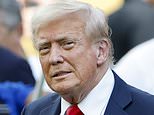In a dramatic shift, former President Donald Trump executed a significant U-turn on his stance regarding a bipartisan bill aimed at banning stock trading for members of Congress, the president, and vice president. This abrupt reversal ignited a fierce public condemnation of Senator Josh Hawley, the primary sponsor of the legislation, revealing deep divisions within the Republican party on issues of congressional ethics and financial transparency.
Initially, Trump had offered measured support for the concept of the legislation, a surprising development that hinted at a potential bipartisan consensus on an issue often mired in partisan conflict. This early, albeit tacit, endorsement suggested a path forward for the proposed stock trading ban, which seeks to address concerns over insider trading and perceived conflicts of interest among elected officials.
The bill, known initially as the PELOSI Act and later rebranded as the HONEST Act, explicitly targets the practice of lawmakers, the president, and vice president holding or trading individual stocks while in office. Senator Hawley’s initiative gained traction after robust public discourse regarding the financial activities of prominent political figures, aiming to restore public trust in government through stringent ethical standards.
Senator Hawley initially celebrated the conditional support from the former president, viewing it as a major step forward for his legislative efforts. He emphasized the straightforward nature of the bill: preventing elected leaders from profiting through market activities tied to their positions. This moment of unity, however, proved to be fleeting as the political landscape rapidly shifted.
Hours after his tentative approval, Donald Trump launched a blistering attack on Hawley via social media, accusing the Missouri senator of “playing right into the dirty hands of the Democrats.” Trump framed the stock trading ban as a move detrimental to the country, suggesting it primarily benefited figures like Nancy Pelosi and her husband, despite its bipartisan backing and focus on legislative transparency.
This public rebuke underscored the intense political maneuvering behind the scenes, with reports indicating a significant push from within the executive branch to thwart the bill’s passage. Concerns were raised that such legislation could deter individuals from seeking public office due to perceived economic disincentives, adding another layer of complexity to the ongoing legislative battle.
The debate over the stock trading ban also revealed divergent opinions among other Republican senators, with some labeling it a “publicity show” while others, like Senator Ron Johnson, voiced concerns about its potential impact on future candidacies. Despite the internal GOP friction, the bill garnered support from Democrats like Senator Richard Blumenthal, and even former Speaker Pelosi, whose evolving stance highlighted the broad appeal of enhanced congressional ethics.
Ultimately, Trump’s dramatic political U-turn transformed what appeared to be a nascent bipartisan effort into a charged ideological conflict. The legislative battle for a congressional stock trading ban continues, emphasizing the persistent challenges in balancing public transparency with the personal financial interests of those in power. This incident illuminates the complexities of enacting meaningful ethical reforms within the volatile landscape of Washington politics.





Leave a Reply